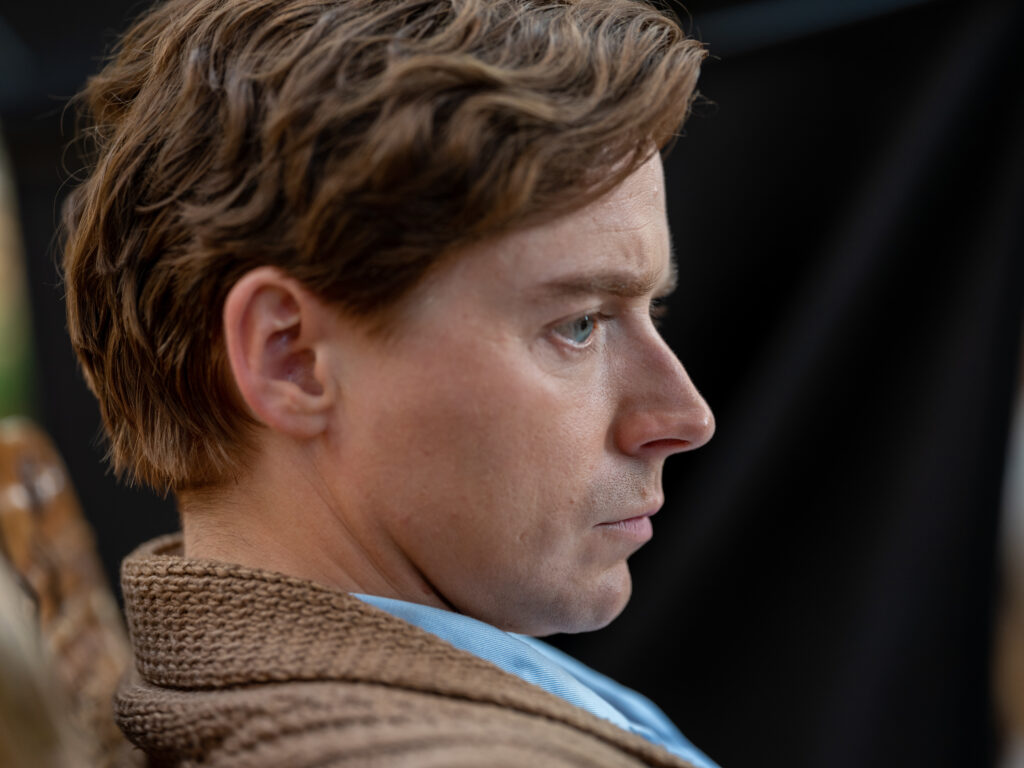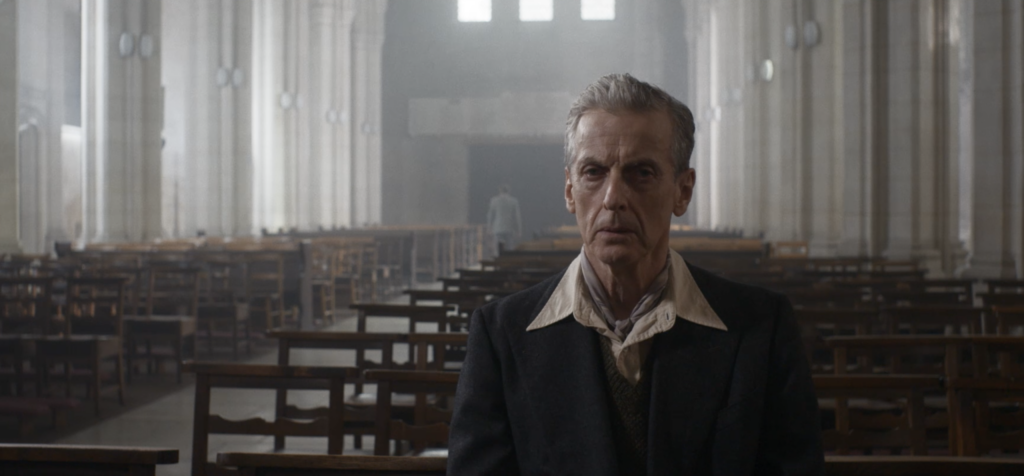
Written by: Terence Davies
Directed by: Terence Davies
Starring: Jack Lowden, Peter Capaldi, Calam Lynch, Anton Lesser, Ben Daniels, Simon Russell Beale, Kate Phillips, Gemma Jones, Geraldine James
Siegfried Sassoon is a name that rings in the memory of every pupil who’s ever been taught about “The Great War Poets.” While Wilfred Owen is often thought to have had the more cogent and eternal poetry, and the more tragic personal story – it’s Owen who can claim to have written Dulce Et Decorum Est, and Owen who died just one week before the end of World War I – Benediction takes us in to the world of Siegfried Sassoon, the poet who lived.
The first thing to appreciate about Benediction is that it really feels more like a filmed play than an out-and-out movie project. It rings with both expertly read poetry, flickering black and white footage of the war in action, and stills of battlegrounds to push home its points. The tone is necessarily sombre, but then if you came to a film about the life of Siegfried Sassoon looking for a laugh-a-minute romp, you were already in the wrong room.
Benediction, released in the UK on 20th May, 2022, is an attempt to take us beyond the crib notes of Siegfried Sassoon, War Poet, and show us Siegfried Sassoon the angry young man, Siegfried Sassoon the post-war social darling, Siegfried Sassoon the gay man in a straight world. And most of all, Siegfried Sassoon, the seeker after both truth and peace of mind throughout the course of his post-war life.
In that, it succeeds massively. It brings together a phenomenal cast, fairly studded with star names, and drops us into the initial days of Sassoon’s fame and notoriety as a war poet with a spitting, bitter and unflinchingly realistic vein in satire, and a melting mood of lament for all the lives lost.

That, to some extent, is printing Sassoon’s legend, and it’s important that it’s here. But what most people don’t know is that his passion to stop the senseless slaughter of soldiers’ lives went much further than his verses. He wrote a letter to his commanding officers, entitled Finished With The War: A Soldier’s Declaration, in which he defiantly stated that he would no longer fight while the war was prosecuted for (as he saw it) the purposes of conquest and jingoism.
That meant he could have faced a court martial, and been shot as a traitor – and Jack Lowden’s Sassoon leaves you in no doubt that he felt strongly enough that he would have embraced that fate rather than trying to dodge it. The letter was both published and read aloud in Parliament, drawing both praise from pacifists and soldiers and condemnation from the forces of authority.
Rather than being shot though, Sassoon was sent to Craiglockhart War Hospital near Edinburgh, on the grounds that what he’d written showed he was not presently fit to command men.
We follow Lowden’s Sassoon there, and through therapy sessions with a Dr Rivers (played in a quietly, assuredly scene-stealing way by Ben Daniels). It’s here that Sassoon also meets Wilfred Owen (Matthew Tennyson), becoming what Owen later described as “Keats, and Christ, and Elijah” to his fellow poet. The two had a significant attraction to one another on many levels, though in Benediction at least, it’s never shown as being a sexual relationship. In fact, the two are positively heartbreaking to watch, conveying real yearning for one another through the screen without ever getting overtly physical beyond standing close together and occasionally dancing within the context of theatrical rehearsals.
Not that the film is particularly shy when it comes to showing Sassoon’s relationships with men. After the war, we see him in several of his love affairs, in particular with society composer, Ivor Novello (Jeremy Irvine), who appears to have been particularly vile, and certainly comes off looking like the most objectionable character in the film. Benediction dwells most though on Sassoon’s relationship with aristocratic aesthete and “Bright Young Thing,” Stephen Tennant (Calam Lynch).
Tennant was both significantly ill while their relationship was ongoing, and also spectacularly self-revolving, and Lynch’s performance helps make such an inherently ridiculous aesthetic pose feel like a genuinely achievable and sustainable viewpoint, despite the realism making him a character who’s never particularly any fun to be around.
When their relationship ended in real life, Sassoon was devastated, but the film skips over that emotional beat – only to pick it up decades later. Here, Sassoon, after a lifetime of both struggling with and eventually embracing his homosexuality, proposes marriage to good-natured socialite, Hester Gatty (played lightly and realistically by Kate Phillips). The birth of their son, George, is a kind of closure point for the narrative – but only as far as Jack Lowden’s Sassoon is concerned.
It’s worth saying that Lowden gives a central performance that’s entirely captivating. When he’s on screen, for the most part, you’re not looking anywhere else – with the caveat that Ben Daniels’ performance as Dr Rivers draws your whole attention in the scenes of young Siegfried’s therapy sessions.
But Lowden’s performance is intensely nuanced, meaning you watch every muscle in his face, every move he makes, because it reveals the intention in every scene of a man who describes himself on screen as “never taking a risk. Never being impulsive.”
While the young Sassoon of Benediction is rarely overtly cruel to the people around him, his talent in poetry depends on locating the bitter twist of irony and parallel, and Lowden makes you believe that both Sassoons exist in the same man, the courageous and the biting. In particular, his recitation of Sassoon’s poem When I’m Among A Blaze Of Lights – which essentially revealed how sickened he was by society parties and their shallowness – while standing in a society party gives you the real measure of the man.
Just as when he wrote his Soldier’s Declaration and practically dared the army to kill him for it, so he stands, specially invited, in the midst of all society’s pomp and finery, and calls it out to its face. That was evidence of the bravery for which he was actively commended during the war before it managed to turn his stomach.

Benediction gives us a whole other Sassoon for our money, though. An older Sassoon, who, having seen horror, and brightness, and beauty, having committed himself to a life with men only to marry a woman and father a child, feels the late-life call to convert to Catholicism.
For many, including his now grown son, George (Richard Goulding), it’s a baffling contradiction. Siegfried Sassoon, poet of bitter brilliance and no respecter of authority simply for authority’s sake – converting to Catholicism? The oldest continuous authority based on unquestioning obedience available to him in the western world?
Older Sassoon is played in Benediction by Peter Capaldi, who in a sense feeds off the performance of Lowden, governed as it is by small movements showing off the nature of the character. But by the time Sassoon has reached his later years, there’s an exaggeration of his stillness, so that Capaldi’s performance is stoic to the point of frequent immobility, punctuated with sharp outbursts.
Still conveying a character while seeming to do so very little is an art from all its own, and as with Lowden, when Capaldi’s on screen, he’s the only person you’re watching, and the only one you’re listening to. Here he delivers an acting masterclass, because you’re never entirely sure whether his Sassoon is supposed to be silently churning away the regrets of a life of lost loves, lost friends, and the impermanence and fragility of life itself, despite his own fathomless and relatively random survival… or if he’s just sitting there.
If that sound glib, it’s a glibness explicitly referenced in the film, as George asks his father whether he’s thinking great thoughts, only to be answered with the simple “No, I’m just sitting here.”
Sassoon’s conversion to Catholicism, as he explains it, is part of a search for something permanent – a particularly poignant explanation given that he and his wife Hester (played in her later years by Gemma Jones with a richly believable exhaustion) are parted towards the end of the film.
It’s not for us to speculate on the reasons behind that parting, and certainly neither of the Sassoons Benediction puts before us look to be easy or especially convivial company.
The ending of the film is in no sense climactic, but it certainly makes logical and emotionally satisfying sense, and the film itself will stay with you for days after you finish watching its two-and-a-quarter hours of storytelling.
Would we recommend it as an experience?
Absolutely, yes, but only to particular people. Obviously, you pretty much have to care who Siegfried Sassoon was to get your money’s worth from the film. In a world where war is once again the subject of daily news reports though, it’s a film that humanises conflict, and if it doesn’t scream about the injustice and the waste of war, it, like Sassoon himself, uses all its powers to debunk any pomp and celebration, any sense that wars led by incompetents, with the bodies of conscripted soldiers as playthings, lied to, puffed up, and swept away like chess pieces.
It’s not by any means a perfect film – projects that are written and directed by the same person frequently lack a creative tension and allow for self-indulgence, and there are unnecessary scenes in Benediction that would have been better left on the cutting room floor.
But at its heart, Benediction tells a compelling story, slowly, methodically, and with plenty of poetry – both that written by the poets of the age, and within its own narrative framework. If all you know is the Siegfried Sassoon of the poetry syllabus, and you want to understand him more as a human being, then Benediction is one for your Must-Watch list.
Tony Fyler



Be the first to comment on "Benediction"